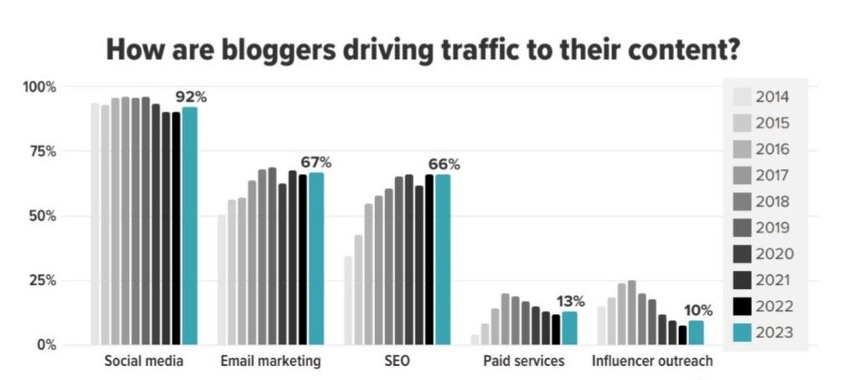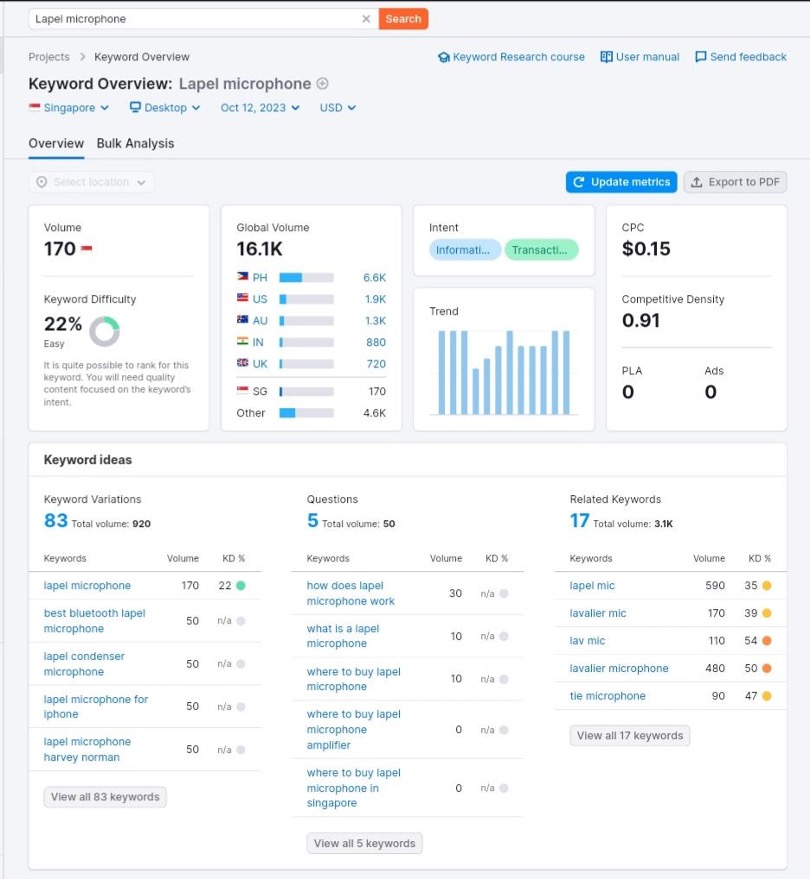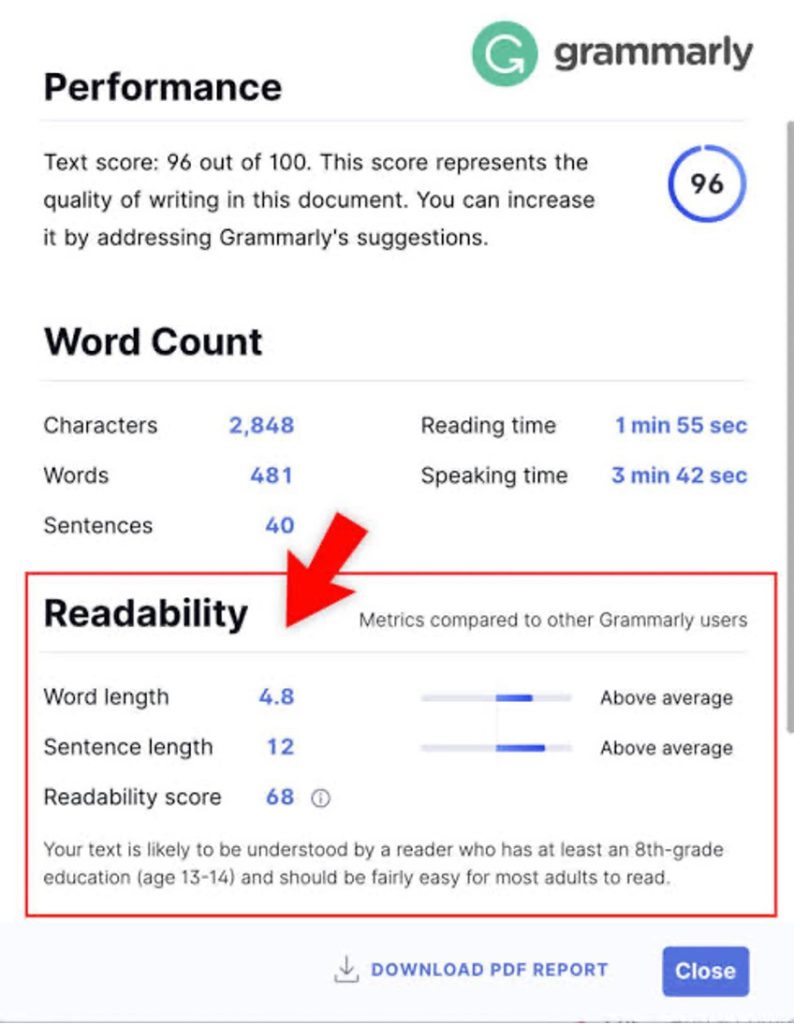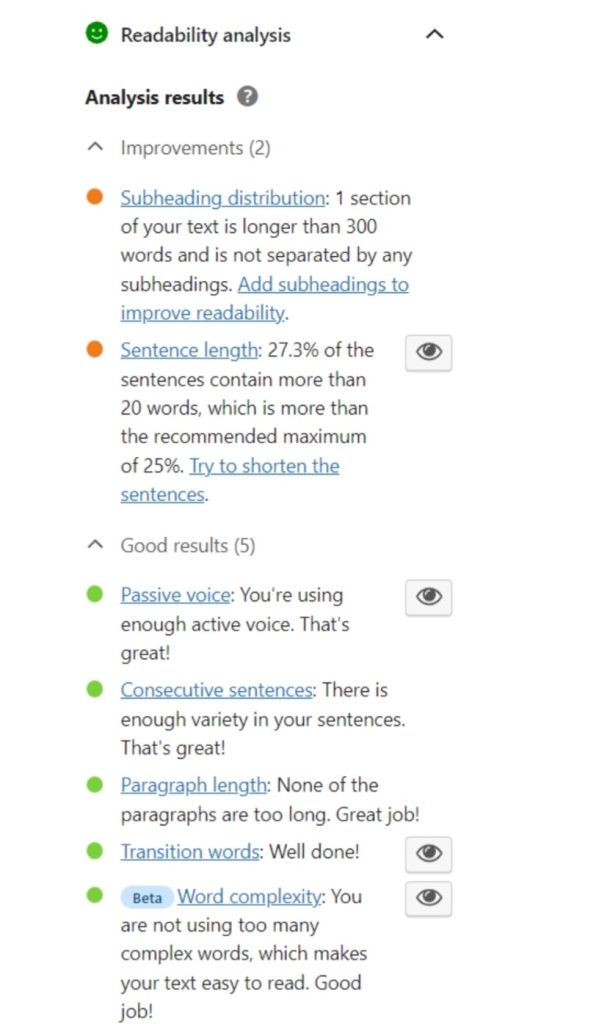It is relatively simple to post information online and even easier to acquire access to this information. Though the world evolves, the foundation of all knowledge will always be text, which is why blogs will never go away.
However, throughout the years, blogs have evolved. As a blogger, you must plan the strategies to captivate your audience and keep them reading until the conclusion. You also need to ensure that your material is authentic. The most crucial thing, however, is to ensure that people discover your blog.
Over 6 million blogs are written every day, and with WordPress being the most popular platform for blog distribution in Singapore, it’s really a maze out there. You need to discover a way for your blogs to stand out, and the winning formula is to use Search Engine Optimization (SEO) on them.
In this article, we will see all the comprehensive information and the best practices on SEO for bloggers to rank better in search results.
What is SEO for blogs?
As the name suggests, blog SEO is the SEO of blogging.
Blogging for SEO improves your website content so more people can find it on search engines. It’s not just about writing; it’s also about organizing the site and using the right words. You use specific words, write good content, create links, and ensure images are well set up. Some other technical blog SEO include:
- Adding plugins
- Mobile Friendly, and
- Faster loading time of webpages.
The main aim of SEO for blog is to get more people to visit your site by making it easy to find and engaging for both search engines and readers.
Check out this guide to dive deeper into search engine optimisation.

Why Are Blogs Good for SEO?
“Content is King”
Remember the saying? It’s still true in 2024. Blogs play a crucial role in enhancing SEO by consistently introducing fresh content. With Google at the forefront, search engines favor websites that keep their information current. They prioritize content that meets high-quality standards and delivers value to readers.
When you engage in blogging, you’re fine-tuning your site for better ranking. Blogs excel in honing in on specific keywords, enhancing the visibility of your website. A consistent posting schedule signals to search engines that your site is active, resulting in improved rankings. On a broader scale, blog for SEO contribute to heightened visibility, increasing the likelihood of people discovering you online.
The impact of engaging blog content goes beyond attracting readers—it keeps them engaged. This extended visitor duration is a positive indicator for SEO, as the longer individuals stay on your site, the more favorable it appears to search engines. SEO for a blog also open avenues for internal and external linking, elevating your site’s authority and overall ranking.
For bloggers, garnering traffic is a significant achievement. Even if your blogging is purely for enjoyment, having people read your content is rewarding. In 2023, SEO for blogs secured its spot as the third most effective means of driving traffic. More traffic equals more clicks, likes, comments, and overall interaction. Furthermore, SEO brings in organic traffic, adding an extra layer of satisfaction.

On the business side of things, search engine optimisation has the numbers to back itself. Reading a blog has done well to convince 56% of surveyed customers to buy a product and that same percentage of marketers attest to the effectiveness of blogging as a marketing strategy. Mind you, these are blogs in general and not just a blog post for SEO. So let’s put things into perspective; say you have an online store and it gets 100 visits per day, using the metric, you would sell 56 items per day. Let’s assume you use SEO on your blogs, it would increase your traffic and you could be getting 200 visits per day, which would lead to you selling 112 items per day! You would have sold more items than the number of visits you would get without it.
Blog SEO Best Practices
You’re probably more curious now after realising why a blog is important for SEO. It’s very important to understand the right practices. Here, we show you how to optimize blog posts for SEO!
Majorly, you have to think about SEO as not just one thing but a group of things with the sole aim of optimisation. 5 main puzzle pieces can make your blog post attain its full potential in terms of reach. Let’s go through what they are and how they can increase the ranking of your blogs on Search Engine Result Pages (SERPs). For a case study, you can take one of your old blog posts and see how it is doing on these 5 metrics.
Keywords and Key Phrases
Before writing, look up keywords related to your topic. Keywords are essential in SEO because they help readers find information by matching their searches. Conducting thorough keyword research and considering your audience’s behaviors will help you uncover primary, secondary, and popular phrases. Many bloggers skip this phase, emphasizing the significance of content delivery. However, these keywords constitute the most appropriate language for productive communication.
Once determined, the emphasis should be on incorporating keywords naturally into blog material. Numerous SEO tools for blogs can assist you in researching and using keywords. For example, tools like Google Keyword Planner, Ahrefs, or SEMrush help find keywords with high search volume but low competition.
For example, this SEMRush page provides a full breakdown of statistics for the term “lapel microphone” in Singapore.

Focus on Quality Content
When creating content, make sure it’s top-notch, helpful, and engaging. Search engines prioritize information that brings value to readers. Your material should be well-researched, thorough, and tailored to your audience. Crafting outstanding blog content involves a few key elements.
First of all, your content should be informative and engaging. It should offer significant value to your readers.
Additionally, your information should cater to your target audience’s interests, questions, and desires. Engaging content can be in various forms, including text, photos, and videos, all delivered clearly.
Besides, enhance the readability of your content by structuring your information logically with headings, bullet points, and brief paragraphs. Leading Solution offers quality content creation services if you are unsure where to start.
Catchy Title
Your blog post’s title is the first element your reader sees in your article. The title determines if the reader would click or just scroll. An eye-catching title boosts the reader’s curiosity and helps to engage them with the content.
A catchy title should include number, power, uncommon, and emotional words. The proper use of these elements could grab the reader’s attention.
For example;
3 Unspoken Rules of Successful People: Transform Your Routine!
- Number “3”: Offers a clear, concise promise, suggesting that the content is focused and easily digestible.
- “Unspoken Rules”: These are powerful words implying insider knowledge or secrets that aren’t commonly discussed, which can intrigue the reader.
- “Successful People”: This phrase has an emotional appeal, as it connects with the reader’s aspirations and ambitions.
- “Transform Your Routine”: Suggests practical, actionable advice. “Transform” is a somewhat uncommon and powerful word that implies significant positive change, while “Your Routine” uses common words to relate directly to the reader’s daily life.
Additionally, you need to keep on another aspect for an SEO-friendly title:
- SEO-Friendly: Include your primary keyword to improve search engine rankings.
- Engaging: Capture attention and provoke curiosity or emotion.
- Clear and Descriptive: Clearly reflect the content’s topic and value proposition.
- Concise: Avoid overly lengthy titles; keep it to the point.
- Unique: Stand out from similar content on the same topic.
Combining these elements helps create titles that draw readers in and perform well in search engine results.
Readability
Readability is crucial because you must use specific keywords, but having the proper keyword density isn’t enough. Blogs are meant to be enjoyable for both people and search engines.
Search engines read your blog through processes like crawling and indexing to rank them. During this ranking, algorithms look at word usage, clarity, and fact-checking. Some factors are kept secret.
So, being a good writer matters for creating effective blogs for SEO. For example, Grammarly is a tool that can help you improve your readability score.

Article Length
Longer posts often rank better in search engines as they are seen as more informative. However, the content must remain engaging and relevant. Use clear, comprehensive language and ensure accuracy with the latest data and trends.
Organizing content with headings and subheadings aids in readability. Remember, balancing depth with readability is important to keep the reader engaged.
Call To Action
These direct prompts engage your readers, like “Subscribe for more updates” or “Leave a comment below.” A strong CTA can enhance reader interaction, signaling that your content is informative and engaging to search results.
They can vary in format, including buttons, hyperlinks, and widgets. A well-crafted CTA aligns with the blog content and smoothly transitions readers to the next step in their journey with your blog.
Content for People, not SEO
Google’s rules for developing applicable content prioritize a people-first approach. This implies focusing on creating valuable and beneficial content for your audience rather than just targeting search engine algorithms.
The critical component is understanding your audience’s demands and generating compelling and complete information. Besides, you need to ensure a positive and engaging user experience. Prioritizing the audience increases the likelihood that your content will correspond with what search engines value, which may boost SEO performance.
Linking
For better Google understanding, add relevant links to your blog; it’s called internal linking. This helps Google figure out your site’s topic. If you link related blogs you’ve written, you create an SEO-friendly web, guiding readers through your content.
Backlinks are like rewards. When other sites link to yours, it’s a vote of confidence. Google sees these votes, boosting your blog’s credibility and rank. More ranks mean more traffic, profit, and engagement. That’s why blogs are important for SEO.
Article Structure
Blogs are like essays but more personal. They let you express yourself, be conversational, and sometimes casual. However, some go too far. Even with personalization, your blog should have a basic structure – introduction, body, and conclusion. To enhance this structure:
- Use clear headings and subheadings.
- Group related parts into appropriate paragraphs.
- Use transition words for smooth flow.
- Add a table of contents when needed.
This structuring improves blog readability. Tools like Yoast in WordPress and Shopify can help to check the structural aspects.

This helps readers and search engines alike, making your blog relatable and desirable. When you’re able to make someone read long content as a whole, there’s little or no chance they have a need to stop or leave till they’re done. And if you’ve internally linked your other blogs, you’ll keep them there for a while.
How Leading Solution Can Optimise Blogs for SEO
SEO benefits your blog in various ways, including raising its chances of ranking higher in search engine results (SERPs) and increasing traffic and conversion rates.
Effective SEO implementation includes;
- conducting keyword research,
- utilizing internal links and
- keeping the appropriate content length and structure
These approaches improve the readability and discoverability of your blog content, which provides benefits on multiple levels.
Transform your online presence with Leading Solution, a trusted name in digital marketing and website design and development in Singapore. Our professional SEO services, including SEO for local businesses and SEO for e-commerce, are tailored to drive traffic, enhance visibility, and maximize conversions. Partner with us to elevate your brand through expert affordable website design and a results-driven digital marketing strategy. Start your journey to online success now!
FAQs
Do Blogs Help SEO?
Yes, blogs contribute significantly to SEO. They generate new material that search engines enjoy, aid in targeting long-tail keywords, and increase user engagement, all of which contribute to increased site authority and ranks.
Are longer blogs better for SEO?
Length just is not a factor in determining the SEO of a blog post. The key is the depth and quality of the content. A longer post covers all the topics that look more authentic and informative. This comprehensive coverage of information can help you rank higher in search engines. However, the content should be engaging and valuable to the readers.
How Can I Do SEO for My Blogs?
Implement SEO by conducting keyword research, optimizing post titles and meta descriptions, using headers appropriately, ensuring mobile-friendliness, and regularly updating high-quality content—track performance with tools like Google Analytics for ongoing improvement.
How Often Should I Update My Blog for SEO?
Frequency updates tell search engines your blog is current, but relevance and quality matter more than quantity.
Do Keywords Still Matter in Blog SEO?
Yes, but they should be used naturally within high-quality, relevant content.
Should I Focus on On-Page or Off-Page SEO?
Both are important. On-page SEO optimizes content and structure, while off-page SEO involves external factors like backlinks.


